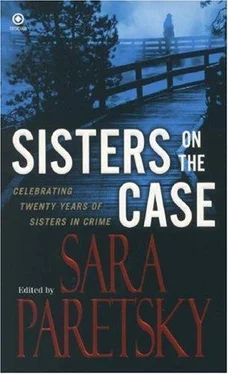‘‘First in his class.’’ Maubi beamed with pride. ‘‘He got a scholarship to Cornell to study hotel management. He works at Harborview on weekends, they want him full-time this summer.’’
He called to his son. ‘‘Quincy! You take this food and see Miss Kelly gets to her car safe. Then come back and help me close up. It’s time we go home.’’
Quincy and I were at my car when we heard a clopping sound like horses’ hooves, followed by Maubi’s cry, ‘‘Jumbie be gone!’’
We quickly turned toward the van to see Maubi throwing salt in the air through the serving window.
Maubi pointed at Kongens Gade in the direction of the Anglican church on the western edge of town. Quincy sprinted up Isabeya’s main street against the sparse one-way traffic while I stayed at the van.
‘‘Maubi, what happened?’’ I asked.
‘‘I feel a chill. A sure sign there be a jumbie about.’’
I looked around and saw nothing out of the ordinary. The salt under my feet rasped like sandpaper against the rubber soles of my flip-flops.
‘‘Why the salt?’’
‘‘Jumbie cure. If you throw salt on the skin of a jumbie, it can’t harm you. I always keep my salt close.’’
I thought of my grandmother’s tales of spirits in her native Ireland, and the luck stone with a hole in it she’d given me when I was a child that now hung from a leather thong over my bed with my collection of dream catchers. The Irish tradition said if anyone looked upon you with an evil eye, looking back at them through the hole in the stone would ward off any harm they might wish you.
Quincy jogged slowly back to the van, panting from his fruitless exertion.
Maubi took his cane from a hook and pounded it against the floor of the van. A sound reminiscent of horses’ hooves. He began to laugh. He laughed until he was gasping for breath and tears were streaming down his face.
‘‘I fool you,’’ Maubi said when he was able to speak.
Quincy and I were not amused.
The next afternoon I took the ferry from the Dockside Hotel on the Isabeya waterfront over to Harborview on Papaya Quay where Quincy was working at the water sports pavilion.
The history of Papaya Quay includes a ghost.
Until the fire that destroyed Isabeya in 1764, Papaya Quay was uninhabited.
After the fire, the Danish government was homeless with only Fort Frederick left standing to house the soldiers and dispossessed town residents. Temporary Government House quarters were established on Papaya Quay.
When the first phase of the new Government House at the foot of Kongens Gade was completed five years later, Papaya Quay became the governor’s private retreat.
Island legend tells us that the governor had a mistress-an enchanting beauty who claimed descent from the original Arawak Indians-whom he stashed at Papaya Quay until her death one night during an early spring yellow fever epidemic. She was buried on the quay, but her grave has never been found.
It is said she haunts her former home to this day, walking back and forth along the Harborview terrace waiting and watching for her lover to come to her by boat.
Quincy and I sat on the terrace drinking iced tea. We decided to bring the legend to life that very evening.
We enlisted the help of two of the Mocko Jumbies-gaily dressed dancing figures on stilts, a highlight of every St. Chris parade.
Shortly after midnight, Isabeya was again shuttered and silent, the quiet broken only by chirping crickets near the gazebo bandstand on the green between the fort and the library, the slap of waves against the boardwalk, and twanging boat lines. The Harborview ferry was docked for the night at Papaya Quay, the boat captain snoring in his bunk in the harbor-master’s quarters.
Maubi sat in his van facing the harbor, chatting with the last of his customers. He stopped in the middle of a story to stare wide-eyed at a wooden rowboat approaching the seaside boardwalk from the direction of Harborview. He began to shiver.
In the boat were a man and woman in eighteenth-century clothing. The man wore a Danish officer’s uniform, with the scarlet sash across his chest favored by the governor for formal occasions. The woman was dressed in a resplendent ball gown, a gossamer shawl covering her head and shoulders.
Maubi grabbed the salt.
The man extended his hand to help the woman alight from the boat. As they passed silently arm in arm in front of Maubi’s van, salt showered the couple like wedding rice.
The electric lights in front of Government House blinked once, then went out. Flickering candle flames were visible in the windows of the Government House ballroom. The couple passed through the locked iron gates separating the Government House driveway from Kongens Gade, up the broad set of outside stairs to the double doors at the formal entrance on the second floor. As they slipped through the doors, the strains of a minuet were heard from the candlelit ballroom. Once the couple was inside, the music ceased and the candles were extinguished one by one until Government House was again darkened. A woman laughed merrily. Then all was silent. The lights in front of Government House slowly brightened to normal.
Quincy and I bit our fingers to keep our guffaws in check. My luck stone dropped from my hand to rest on my chest like a pendant suspended from the leather thong around my neck.
As we were ready to leap from our hiding place to yell ‘‘Fooled you!’’ at Maubi, a second boat approached the boardwalk. A rogue wave caught the boat broadside, spilling the occupants into the sea. We heard familiar voices cursing as they thrashed about in the shallows, weighted down by their heavy clothing. Quincy and I ran to the boardwalk to help our sodden friends out of the water.
When we talk about that night, which isn’t often, we always have shakers of salt in our hands.
‘‘Maubi and the Jumbies’’ was originally published in the Fall 1999 issue of Murderous Intent magazine. In 2000 it was an Agatha nominee for Best Short Story and received a Best Short Story Macavity Award.
Estelle Is Dead by Medora Sale
TEMPTATION
Kate Brady tossed her keys on the table and began sorting rapidly through a week’s worth of mail. The brightly colored flyers landed in the basket in the hall; everything else, no matter how unpromising it looked, went into the dining room with her. Once she had trashed a check for eighteen hundred dollars because it had come in an envelope that looked like a begging letter. Now she opened everything.
Bills and financial statements went into a pile. Requests from charities and classier advertising glided into another wastepaper basket. The last envelope was from a university, probably raising funds. She slit it open impatiently, glanced at the single sheet of paper inside, and paused.
Her hand hovered over the basket, drew back, and set the letter down on top of the bills and statements, to be taken into her tidy little office.
She disposed of the bills and statements rapidly and efficiently, checking every item, prepared-if necessary- to spend the rest of the day disputing an interest charge or error. She had fended off poverty and evictionfor too long after leaving home to turn careless over money.
Only the letter remained. It demanded a decision. She was between books. Worse yet, between contracts. An irritating restless lethargy enveloped her, prodding her into useless activity and keeping her from sleep. And yesterday a set of royalty statements had arrived, confirming what she already knew. Sales of her type of fiction-the romantic-sadistic thriller-were falling. People were tired of bodice slashers. She lay awake at night thinking of a long old age and no new income. When that onetime windfall, the film rights to Death on a Double-Edged Blade, had come in twelve years before, her accountant had pointed out that she had better figure on living at least until eighty-five. Forty-seven more years, it was then. She had bought her house, paid cash for it, and started salting away her money. But it wasn’t going to be enough.
Читать дальше












